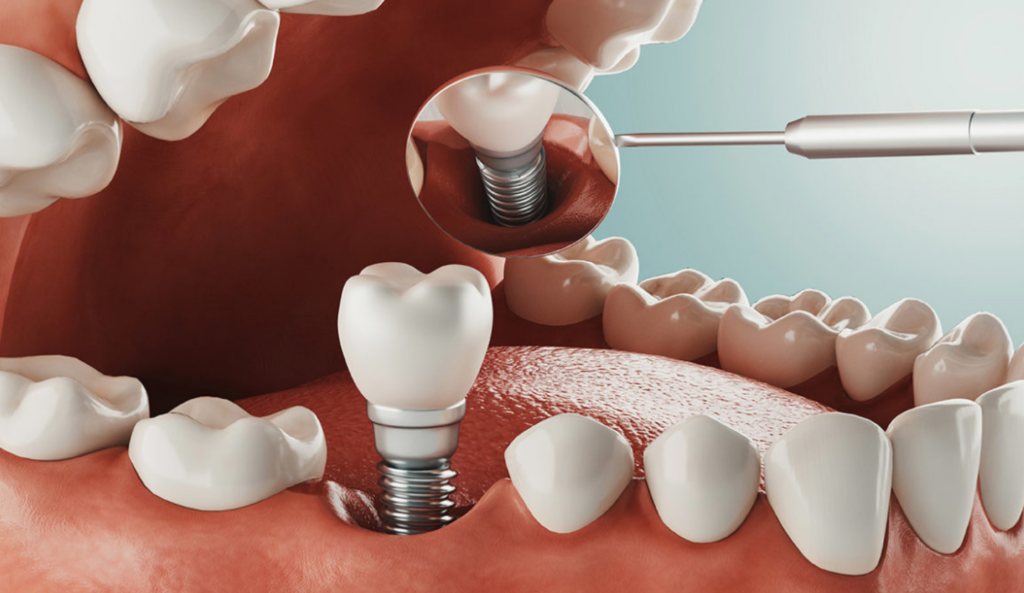How Dental Implants Can Help You Have a Better Smile
Dentists in the United States installed more than 5 million dental implants each year, making them a popular and successful tooth replacement alternative. While dental implants do have some disadvantages, they also provide a long list of advantages that many other tooth replacement solutions can’t or won’t deliver. For many people, the benefits of dental implants greatly exceed the drawbacks. Here are some of the benefits of dental implants if you’ve lost one or more teeth.

1. Dental implants are a diverse treatment option.
The number of teeth that bridges, partial dentures, and full dentures can replace is restricted. As a result, depending on how many teeth you’ve lost, your treatment options may be limited. Implants, on the other hand, are a treatment that can be used in a variety of ways. They can be fitted with a crown for a single tooth, a bridge or partial denture for numerous teeth, or full dentures for all of your teeth. This allows you and your dentist to come up with the ideal treatment plan for you.

2. They’re more comfortable.
Dental implants are surgically implanted into your jawbone to mimic the root of a tooth and provide extra strength and support to the prosthetic. Your jawbone actually grows around the titanium rod in your jaw during the healing process, securing it even more firmly in place. This extra stability makes implants feel almost identical to natural teeth, to the point where you’ll forget they’re there. Other tooth replacement methods simply cannot replicate the sensation of dental roots, making them feel less secure and natural than implants. The difference in comfort between implant-supported dentures and regular dentures is probably the most striking. Implants secure your denture in place, minimizing the discomfort of loose dentures as well as the need to deal with unpleasant denture adhesives. These are just a few of the advantages of dental implants that have persuaded many people to select them over dentures.

3. It is easier to speak with implants.
Because our teeth play a vital part in helping us make specific sounds, removing a few critical front teeth might cause a surprising shift in your speech. Similarly, loose dentures might cause you to slur or lisp while you talk. This can be humiliating and distracting since you’re constantly worried about your teeth slipping or how your voice will sound. Both of these problems can be resolved with implants. If you just have a gap between your teeth, implants provide a surface for your tongue to press against when forming words, making it considerably easier to talk right away. Furthermore, multiple deeply embedded implants hold implant-supported dentures firmly in place, preventing them from slipping or sliding about in your mouth. As a result, one of the benefits of dental implants is the ability to talk freely and confidently.

4. They provide you the freedom to enjoy your favorite meals.
If you’re missing a few molars, you’re probably aware of how much a few missing teeth might affect your ability to chew certain meals. Implants bridge the gap, allowing you to eat normally once more. Implant-supported dentures also don’t have the same food restrictions as traditional dentures because they’re anchored into your jawbone. You can continue to eat your favorite chewy or crunchy foods—even corn on the cob! You’ll also never have to worry about your dentures slipping as you eat, so you may eat whatever you want in public without feeling self-conscious.

5. The implants appear to be natural.
Dental implants now look as natural as they feel because of advances in materials and technology. Your prosthetics are custom-made for you, ensuring that your smile appears just as good as it feels. Your prosthetic tooth is designed to mix in flawlessly with your natural teeth if you have them. With acrylic gums that match the color of your actual gums, even dentures look wonderfully lifelike. No one will be able to tell which of your teeth are natural and which aren’t if you use crowns, bridges, or dentures to cover your implants.

6. They can assist in boosting your self-esteem.
If you have a gap in your smile, you are probably well aware of how self-conscious it makes you feel. It’s all too easy to get caught up in what other people think of the gap or how it may affect your speech. Implants can give you a grin that looks and feels natural, giving you the confidence to talk and smile. You can simply go out and have fun without giving your teeth a second thought.

7. They are beneficial to your oral health.
Despite the fact that obtaining a dental implant may seem invasive and frightening, many dentists consider implants to be a more conservative treatment option for lost teeth. This is due to the fact that implants have no detrimental impact on your natural teeth. In the same manner that natural teeth are supported, implants are secured directly in the jaw. Bridges, on the other hand, are supported by crowns placed on the healthy teeth adjacent to the gap in your smile. It’s never a good idea to do dental work on otherwise healthy teeth because it can weaken them. Maintaining your dental health for years to come might be as simple as leaving your healthy teeth alone.

8. They guard against bone deterioration.
The roots of your teeth play an important role in your jawbone’s growth by transmitting signals to it. When you lose a tooth, your body begins to resorb the bone that was once the tooth root, causing your face to cave in over time. This vital role is performed by the titanium rod that attaches your implant into your jawbone, even stimulating the jawbone to grow around it during the healing process. Not only does it safeguard your face form by preventing bone loss, but it can also restore some bone loss that has already occurred. Other tooth replacement solutions can’t stimulate the jawbone; thus, they can’t do this.

9. Dental implants are easy to care for.
Crowned dental implants are very low-maintenance, requiring simply a regular oral hygiene practice to ensure that they last as long as possible. Brushing your teeth at least twice a day, flossing and using mouthwash at least once a day, and seeing your dentist for regular preventative cleaning at least every six months are all examples of good oral hygiene. You don’t need to take any more steps in your oral hygiene regimen. Implants capped with bridges require only one additional step: cleaning under the false tooth to maintain your gums healthy, but implants capped with dentures require the same level of maintenance as traditional dentures.

10. They’re long-lasting.
Dental implants are extremely long-lasting. Your implant will last a lifetime provided you maintain good dental hygiene, but wear and tear will require you to replace the crown on your implant every 15 years or so. Your complete bridge, on the other hand, will need to be replaced every five to fifteen years, depending on how well you maintain it. Dentures need to be replaced every five to eight years, and they need to be adjusted on a regular basis due to bone loss in the jaw. The long-term endurance of implants saves you money because they don’t need to be adjusted. They’re really simple to maintain after your implant is in place.

